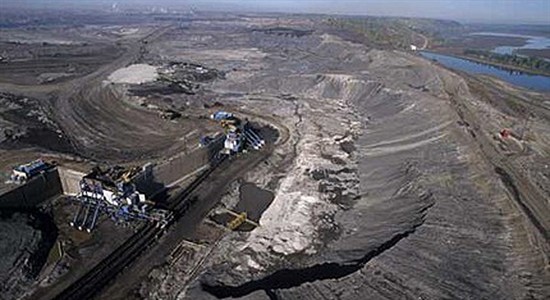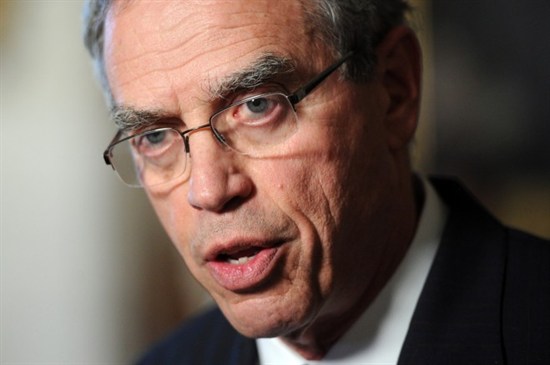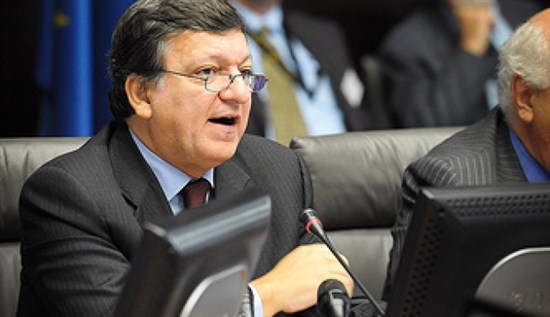Carbon Briefing: Who killed the EU’s transport fuel standards?
Ros Donald, 30 Jan 2014, 13:00. Photo Credit National Wildlife Federation.
Is the fuel that powers our cars set to get a lot dirtier? After 2020, the European Union is to drop the Fuel Quality Directive, a measure designed to help clean up transport fuels. Environmental and business groups have called the decision a coup for Canada's tar sands industry – but who really engineered it, and who really benefits? The answers may be subtler.
The fight to make fuels cleaner
While the EU's emissions in other sectors are going down, emissions from transport keep growing. The EU has introduced measures to tackle this trend, such as standards for new cars and including aviation in emissions trading. But it also wants to make sure EU vehicles are using the least polluting fuels.
In 2009, the EU announced the Fuel Quality Directive (FQD), which requires a six per cent reduction between 2010 and 2020 in the greenhouse gas intensity of all the petrol, diesel and biofuels used for transport. The measure is part of the EU's current suite of climate and energy targets, which create an emissions reduction pathway up until 2020.
When petrol combusts in a tank, the emissions tend to be similar, no matter where the fuel comes from. So cleaning up fossil fuels requires taking a look at the processes used to extract the fuel.
Under article 7a of the law the EU is expected to calculates fuels' emissions intensity on a lifecycle basis, starting from when fuels are extracted and ending when they are emitted as exhaust from cars and lorries.
But although the directive has existed for nearly five years – and is used to calculate biofuels' overall emissions – it has never been used to regulate fossil fuels. That's because member states can't agree on a methodology for calculating lifecycle emissions.
Greener-minded politicians and environmental campaigners have been urging the commission to adopt a directive. They are concerned that without it, the EU will start to get a lot more of its transport fuels from much more carbon-intensive sources like oil derived from oil sands.

Alberta's oil sands.Credit: Greenpeace Creative Commons
Canada lobbying
When asked what's held up the directive, most EU watchers would point to a serious lobbying effort by the Canadian government – which green groups have worked hard to expose over the years.
Reports suggest Canada sees the directive as a threat to its plans to export fuels derived from oil sands to new markets like Europe. Canada claims the directive unfairly discriminates against unconventional fuels and overstates their impact on the environment. It wants to stop the EU from declaring that oil sands have a higher carbon footprint.
When the directive was first announced, Canada set up a task force, the Pan-European Oil Sands Team, freedom of information requests reveal. The group focused on high-level visits to get its message out: campaign group Friends of the Earth documents over 100 meetings between Canadian lobbyists and EU officials between 2009 and 2011, ranging from workshops to visits to the oil sands.
But despite the time and energy invested, Canada appeared to be making little headway, other than delaying the implementation of the directive. Oliver Geden, a senior research fellow at the German Institute for International and Security Affairs says Canada's lobbying effort didn't go over well:
"Many in Brussels were disturbed by the massive scale [of the lobbying; meanwhile] even Canadian public affairs consultants were disappointed by not seeing results for years."
The breakthrough
Finally, in 2011, the commission put forward a proposal that would set "default" values for the amount of pollution more polluting methods of production produce. It would also require oil companies to report the carbon footprint of all their fuels.
It recommends, for example, that oil sands-derived fuel should receive a greenhouse gas rating 22 per cent higher than fuel made from conventional crude oil.
Canada questioned the calculations behind the methodology, claiming it places a heavy administrative burden on companies. It also alleges the commission is penalising oil sands while failing to take account of other polluting extraction practices. For example, the EU gets 35 per cent of its oil from Russia, and smaller amounts from countries like Nigeria and Venezuela, where gas is routinely burned and emitted during extraction.
In a letter to the EU's energy commissioner, Guenther Oettinger, Joe Oliver – Canada's natural resources minister – protested:
"[T]here has not been a comprehensive scientific study of the greenhouse gas intensity of the greenhouse gas intensity of crude oils currently used in the European Union, some of which we know have similar or higher GHG emissions than oil sands crude".

Canada's natural resources minister, Joe Oliver. Credit: The Canadian Press/Sean Kilpatrick, Postmedia News
Canada's argument – and forceful lobbying – appeared to have struck a chord. EU officials were expected to vote on the law in 2012, but the decision was delayed after the commission decided to carry out a full impact study of its impact on business and markets – and to decide whether to carry out further assessments of other fuels' life-cycle emissions.
The commission had previously decided an impact assessment wasn't necessary – but given the weight of all the lobbying, it decided further investigation might muster support, Reuters reports.
Canada had the support of at least one influential member state in the debate over the methodology. The UK has backed its arguments – despite criticism that it is naively buying into Canada's claims, while sources believe the Netherlands – where Shell, which has significant investments in Canada's oil sands – also lent support.
Doug Parr, chief scientist at Greenpeace, tells Carbon Brief:
"Propositions from the European Commission to move forward keep being delayed by countries, including the UK, Spain and Eastern Europe, who are concerned about issues like trade with North America."
A new proposal is expected to be issued in coming weeks, and Canada is keeping up the pressure until the commission releases it. Canada's natural resources ministry launched a report last November that claims crude oil from many of the EU's exporters is just as dirty, if not more so, than oils sands fuel.
US trade adds to the pressure
While the EU is still hammering out the details of how the directive will be enforced until 2020, it runs the risk of disappearing completely after that date. This month, the EU provisionally decided to drop the FQD from its most recent set of climate targets, which will be in force from 2020 to 2030.
The European Commission's white paper outlining its proposed new targets contains a line calling for an end to the target after 2020 – a policy about-face.
But did Canadian lobbying achieve the change alone? Probably not. Evidence suggests Canada's efforts recently received a significant boost from the US.
North American oil is often a mixture of conventional and unconventional sources, so both the US and Canada are afraid a higher greenhouse gas ranking for unconventional fuels would stop them from exporting oil to Europe.
Although US refineries have written to the commission asking to ditch the FQD's differentiation between oil types, the American government had not spoken out openly against the directive.
But at a trade meeting last October, both the US and Canada trade representatives allegedly warned the EU that the classifications in the directive could count as a restraint of trade, punishable by world trade rules and a potential barrier to new trade agreements.
Support in the commission
The prospect that a trade deal with North America could fail sounded the alarm in the commission during talks over the package of measures that are due to take over from the 2020 targets. As EU economies continue to struggle, Europe is desperate to find new business and trade opportunities. A deal with the world's largest economy would prove popular at a time when countries are increasingly critical of the EU.
Sources say the bloc's president, Jose Manuel Barroso, has instructed officials to give way to the EU's trade commissioner, Karel de Gucht, on any issues that may prove crucial to getting the deal through. It could be the FQD was one of them.
What's more, energy and climate commissioners lost control over the 2030 package. According to European Voice, Barroso was so keen to get a quick agreement on the targets that the commission's secretary general, Catherine Day, took over the file. According to reports, it was Day, who opposes more ambitious climate targets for 2030, who ensured the directive was dropped from the proposal.
The lack of consultation with climate and energy commissioners has caused discontent within the commission and adds weight to rumours Barroso was willing to let the FQD go for the sake of trade links with North America.

EU president Jose Manuel Barroso. Credit: Creative Commons/Friends of Europe
Little appetite for a fight
The fight for the directive isn't over yet. Laura Buffet at environmental group Transport and Environment tells Carbon Brief there's still time to have a proposal for implementing the FQD up to 2020. This would discourage high-carbon fuels from entering the EU.
As for the2030 package, the white paper from the commission is only a first step. The decision-making process will continue in the European Parliament and member states at least until 2015. So the FQD could still continue after 2020.
But Oliver Geden is less optimistic. He suggests there is little appetite to get caught up in a battle over how to account for lifecycle emissions. Geden says:
"[Officials] don't have any appetite for specific transport policies within the climate agenda, particularly for accounting battles."
Currently, the commission is at odds over how to correctly calculate emissions from biofuels – and Geden says no one seems keen to get into further fights over fossil fuels, too:
"From a perspective of political-administrative professionals, you don't want to get into battles you can't win."
The fuel quality directive is currently in stasis, and is at serious risk of disappearing altogether. But while Canada's lobbying has been influential in some forums, it's not clear it could have gained the same traction if there were more of an appetite to get stuck into fuel accounting on the part of member states – or if the US hadn't lent power to its elbow.

http://www.carbonbrief.org/blog/2014/01/who-killed-the-fuel-quality-directive/
